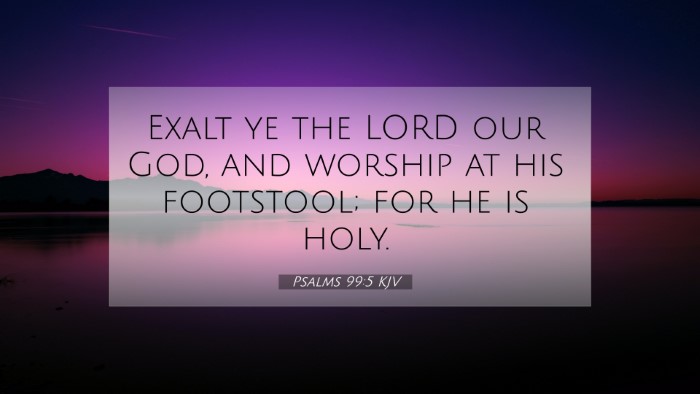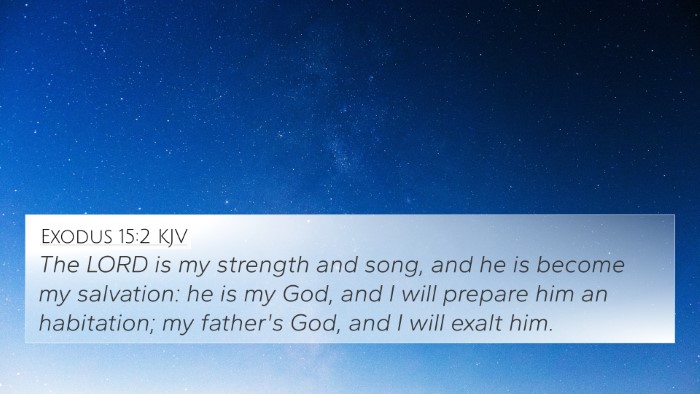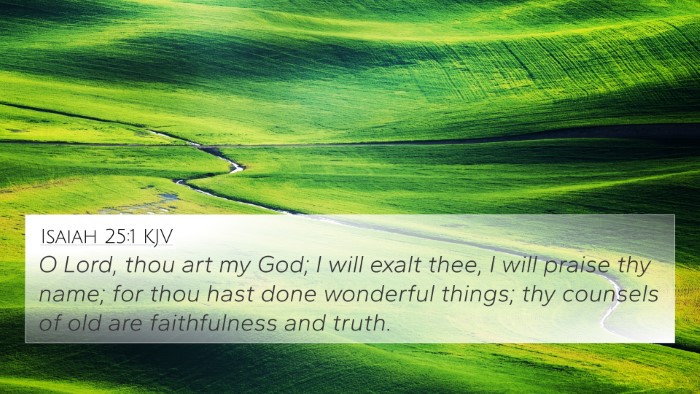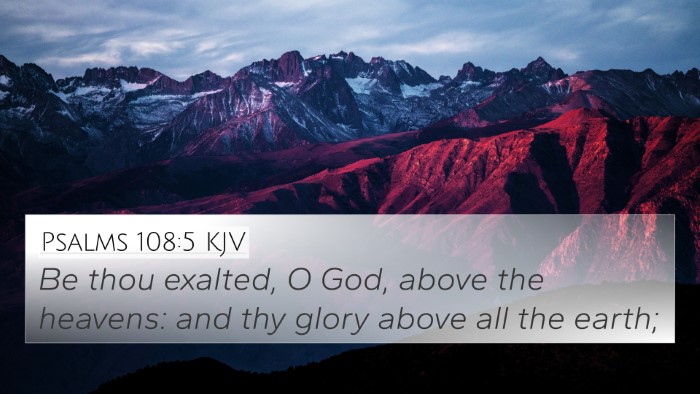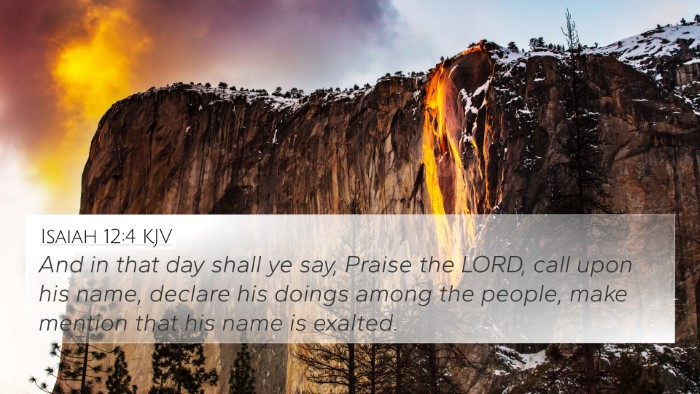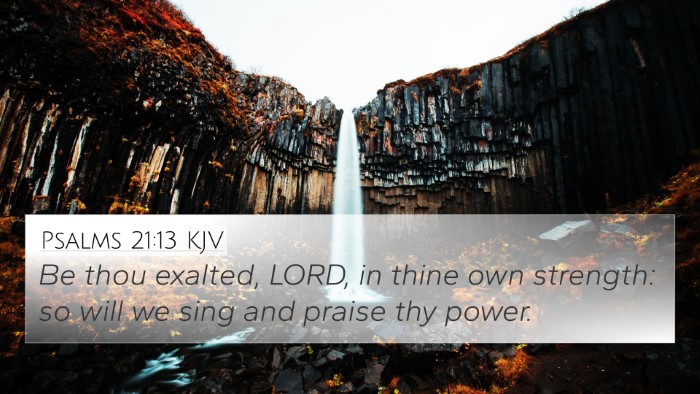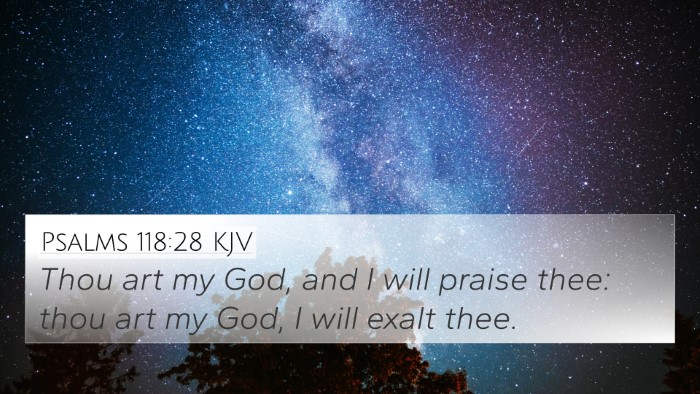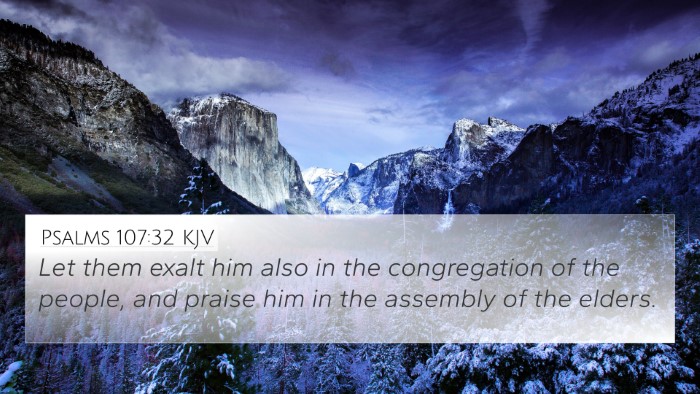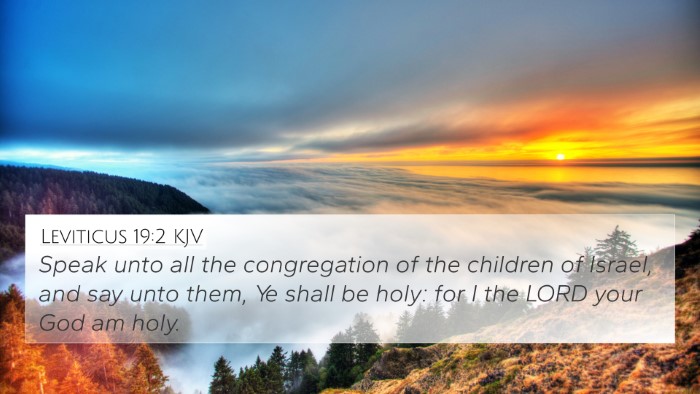Psalms 99:5 - Understanding the Verse
The verse Psalms 99:5 states, "Exalt ye the LORD our God, and worship at his footstool; for he is holy." This passage calls for reverence and worship of God, emphasizing His holiness and sovereign position over creation.
Meaning and Interpretation
When approaching the meaning of Psalms 99:5, it's beneficial to draw insights from notable public domain commentaries.
Insights from Matthew Henry
Henry emphasizes the need for exaltation and worship towards God. He highlights that exalting the Lord involves recognizing His majesty and acknowledging His holiness. The term "footstool" signifies God's sovereignty and dominion, suggesting that even in His exalted status, He invites believers into worship.
Insights from Albert Barnes
Barnes interprets this verse as a call to reverence. He points out that worship should stem from understanding God's holiness. The mention of the footstool symbolizes complete submission to God's authority, encouraging believers to approach Him with humility and respect.
Insights from Adam Clarke
Clarke notes that the directive to "exalt" the LORD is both an individual and communal call. Worship at His footstool underscores the concept that God is accessible, yet His holiness drives us to profound respect. Clarke also highlights the importance of recognizing God's holiness in relation to our worship practices.
Significance of Holiness
The term "holy" is central to this verse, and its implications reach far beyond this single passage:
- Separation from Sin: God’s holiness calls believers to live righteously, exemplified in Leviticus 19:2.
- Worship Response: Genuine worship arises from a recognition of God's character, as observed in Revelation 4:8 where the creatures continually worship God.
- Dependence on Grace: Understanding God's holiness leads sinners to seek grace, referencing Ephesians 2:8-9.
Cross-References from Psalms 99:5
Psalms 99:5 can interconnect with various other Bible verses, enhancing its understanding and contextual depth:
- Psalms 93:5: "Thy testimonies are very sure: holiness becometh thine house, O LORD, forever." - Reinforces God’s holiness.
- Isaiah 6:3: "And one cried unto another, and said, Holy, holy, holy, is the LORD of hosts..." - Affirms the sanctity of God.
- Hebrews 12:28-29: "...for our God is a consuming fire." - Acknowledges God’s holiness calling for reverence.
- Revelation 15:4: "Who shall not fear thee, O Lord, and glorify thy name? for thou only art holy..." - Acknowledges God's exclusive holiness.
- Psalms 100:2: "Serve the LORD with gladness: come before his presence with singing." - Encourages worship in response to God's holiness.
- 1 Peter 1:16: "Because it is written, Be ye holy; for I am holy." - A call for believers to emulate God’s holiness.
- Acts 10:26: "But Peter took him up, saying, Stand up; I myself also am a man." - Context of humility before God’s presence.
Thematic Connections
Examining Psalms 99:5 provides an opportunity to explore connections between Bible verses, especially concerning themes of holiness and worship:
- The Holiness of God: Links with various Old Testament and New Testament scriptures to explore holiness.
- Worship in Spirit and Truth: Illustrates the necessity of genuine worship as seen in John 4:24.
- Divine Sovereignty: Explores the theme that God reigns over all creation, referring to Psalms 103:19.
Tools for Bible Cross-Referencing
To fully understand and explore cross-references for this verse, consider the following tools:
- Bible Concordance: Useful for finding related verses based on keywords.
- Bible Cross-Reference Guide: Helps in identifying thematic links between passages.
- Bible Study Software: Programs that allow for digital cross-referencing and thematic connections.
Conclusion
Psalms 99:5 serves as a profound reminder of God’s holiness and the appropriate response of worship from humanity. Through the insights gathered from various commentaries and cross-referencing with other scriptures, believers can deepen their understanding of how this verse fits within the greater narrative of the Bible. By utilizing cross-referencing tools and recognizing thematic connections, individuals can enrich their study and application of Scripture in their lives.


